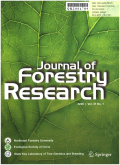- 钛学术文献服务平台 \
- 学术期刊 \
- 农业科学期刊 \
- 林业期刊 \
- 林业研究(英文版)期刊 \
Wood forming tissue-specific expression of PdSuSy and HCHL increases holocellulose content and improves saccharification in Populus
Wood forming tissue-specific expression of PdSuSy and HCHL increases holocellulose content and improves saccharification in Populus
基本信息来源于合作网站,原文需代理用户跳转至来源网站获取
摘要:
Development of strategies to deconstruct ligno-cellulosic biomass in tree species is essential for biofuels and biomaterials production. We applied a wood forming tissue-specific system in a hybrid poplar to express both PdSuSy (a sucrose synthase gene from Populus deltoides × P. euramericana that has not been functionally characterized) and HCHL (the hydroxycinnamoyl-CoA hydratase-lyase gene from Pseudomonas fluorescens, which inhibits lignin polymerization in Arabidopsis ). The PdSuSy - HCHL over-expression poplars correspondingly driven by the promoters of Arabidopsis AtCesA7 and AtC4H resulted in a significant increase in cellulose (> 8%), xylan (> 12%) and glucose (> 29%) content, accompanying a reduction in galacturonic acid (> 36%) content, compared to control plants. The sac-charification efficiency of these overexpression poplars was dramatically increased by up to 27%, but total lignin con-tent was unaffected. These transgenic poplars showed inhib-ited growth characteristics, including > 16% reduced plant height, > 10% reduced number of internodes, and > 18% reduced fresh weight after growth of 4 months, possibly due to relatively low expression of HCHL in secondary xylem. Our results demonstrate the structural complexity and inter-action of the cell wall polymers in wood tissue and outline a potential method to increase biomass saccharification in woody species.

推荐文章
Wood/Cu混合粉末温压成形致密化过程数值模拟
Wood/Cu粉末
温压成形
致密化
数值模拟
A preliminary study on ore-forming environments of Xianglushan-type iron deposit and the weathering
Emeishan basalt paleo-weathering crust
Xianglushan-type iron deposit
Ore-forming environment
Weathering mineralization
Western Guizhou Province
Rapid and sensitive method for determining free amino acids in plant tissue by high-performance liqu
HPLC
OPA
FMOC
Free amino acids
Plant
PLS-DA
Hyperspectral estimation model of soil Pb content and its applicability in different soil types
Hyperspectral data
Heavy metal
Pb
Estimation
内容分析
关键词云
关键词热度
相关文献总数
(/次)
(/年)
引文网络
引文网络
二级参考文献 (0)
共引文献 (0)
参考文献 (34)
节点文献
引证文献 (0)
同被引文献 (0)
二级引证文献 (0)
1969(1)
- 参考文献(1)
- 二级参考文献(0)
1979(1)
- 参考文献(1)
- 二级参考文献(0)
1995(1)
- 参考文献(1)
- 二级参考文献(0)
2001(3)
- 参考文献(3)
- 二级参考文献(0)
2004(1)
- 参考文献(1)
- 二级参考文献(0)
2005(1)
- 参考文献(1)
- 二级参考文献(0)
2006(1)
- 参考文献(1)
- 二级参考文献(0)
2007(4)
- 参考文献(4)
- 二级参考文献(0)
2008(3)
- 参考文献(3)
- 二级参考文献(0)
2009(1)
- 参考文献(1)
- 二级参考文献(0)
2010(5)
- 参考文献(5)
- 二级参考文献(0)
2011(3)
- 参考文献(3)
- 二级参考文献(0)
2012(1)
- 参考文献(1)
- 二级参考文献(0)
2013(2)
- 参考文献(2)
- 二级参考文献(0)
2014(2)
- 参考文献(2)
- 二级参考文献(0)
2015(1)
- 参考文献(1)
- 二级参考文献(0)
2016(1)
- 参考文献(1)
- 二级参考文献(0)
2018(1)
- 参考文献(1)
- 二级参考文献(0)
2019(1)
- 参考文献(1)
- 二级参考文献(0)
2021(0)
- 参考文献(0)
- 二级参考文献(0)
- 引证文献(0)
- 二级引证文献(0)
引文网络交叉学科
相关学者/机构
期刊影响力
林业研究(英文版)
主办单位:
东北林业大学
中国生态学学会
出版周期:
双月刊
ISSN:
1007-662X
CN:
23-1409/S
开本:
大16开
出版地:
哈尔滨市动力区和兴路26号(林大123信箱)
邮发代号:
创刊时间:
1990
语种:
eng
出版文献量(篇)
2459
总下载数(次)
1
总被引数(次)
7852
期刊文献
相关文献
推荐文献
- 期刊分类
- 期刊(年)
- 期刊(期)
- 期刊推荐
林业研究(英文版)2022
林业研究(英文版)2021
林业研究(英文版)2020
林业研究(英文版)2019
林业研究(英文版)2018
林业研究(英文版)2017
林业研究(英文版)2016
林业研究(英文版)2015
林业研究(英文版)2014
林业研究(英文版)2013
林业研究(英文版)2012
林业研究(英文版)2011
林业研究(英文版)2010
林业研究(英文版)2009
林业研究(英文版)2008
林业研究(英文版)2007
林业研究(英文版)2006
林业研究(英文版)2005
林业研究(英文版)2004
林业研究(英文版)2003
林业研究(英文版)2002
林业研究(英文版)2001
林业研究(英文版)2000
林业研究(英文版)1999

 免费查重
免费查重










